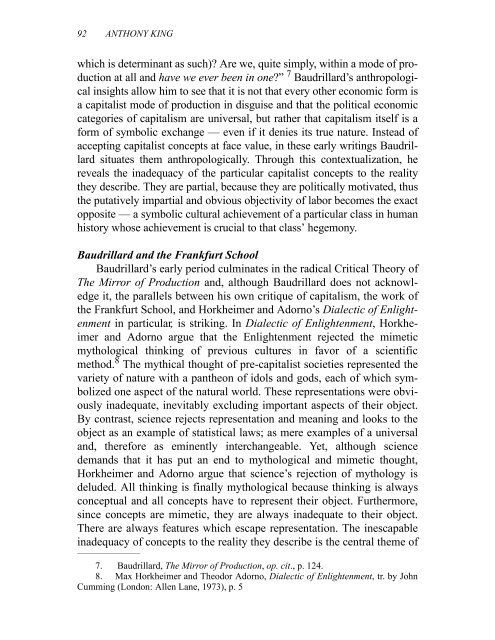King Baudrillard Telos.pdf - Exeter Research and Institutional ...
King Baudrillard Telos.pdf - Exeter Research and Institutional ...
King Baudrillard Telos.pdf - Exeter Research and Institutional ...
You also want an ePaper? Increase the reach of your titles
YUMPU automatically turns print PDFs into web optimized ePapers that Google loves.
92 ANTHONY KING<br />
which is determinant as such)? Are we, quite simply, within a mode of production<br />
at all <strong>and</strong> have we ever been in one?” 7 <strong>Baudrillard</strong>’s anthropological<br />
insights allow him to see that it is not that every other economic form is<br />
a capitalist mode of production in disguise <strong>and</strong> that the political economic<br />
categories of capitalism are universal, but rather that capitalism itself is a<br />
form of symbolic exchange — even if it denies its true nature. Instead of<br />
accepting capitalist concepts at face value, in these early writings <strong>Baudrillard</strong><br />
situates them anthropologically. Through this contextualization, he<br />
reveals the inadequacy of the particular capitalist concepts to the reality<br />
they describe. They are partial, because they are politically motivated, thus<br />
the putatively impartial <strong>and</strong> obvious objectivity of labor becomes the exact<br />
opposite — a symbolic cultural achievement of a particular class in human<br />
history whose achievement is crucial to that class’ hegemony.<br />
<strong>Baudrillard</strong> <strong>and</strong> the Frankfurt School<br />
<strong>Baudrillard</strong>’s early period culminates in the radical Critical Theory of<br />
The Mirror of Production <strong>and</strong>, although <strong>Baudrillard</strong> does not acknowledge<br />
it, the parallels between his own critique of capitalism, the work of<br />
the Frankfurt School, <strong>and</strong> Horkheimer <strong>and</strong> Adorno’s Dialectic of Enlightenment<br />
in particular, is striking. In Dialectic of Enlightenment, Horkheimer<br />
<strong>and</strong> Adorno argue that the Enlightenment rejected the mimetic<br />
mythological thinking of previous cultures in favor of a scientific<br />
method. 8 The mythical thought of pre-capitalist societies represented the<br />
variety of nature with a pantheon of idols <strong>and</strong> gods, each of which symbolized<br />
one aspect of the natural world. These representations were obviously<br />
inadequate, inevitably excluding important aspects of their object.<br />
By contrast, science rejects representation <strong>and</strong> meaning <strong>and</strong> looks to the<br />
object as an example of statistical laws; as mere examples of a universal<br />
<strong>and</strong>, therefore as eminently interchangeable. Yet, although science<br />
dem<strong>and</strong>s that it has put an end to mythological <strong>and</strong> mimetic thought,<br />
Horkheimer <strong>and</strong> Adorno argue that science’s rejection of mythology is<br />
deluded. All thinking is finally mythological because thinking is always<br />
conceptual <strong>and</strong> all concepts have to represent their object. Furthermore,<br />
since concepts are mimetic, they are always inadequate to their object.<br />
There are always features which escape representation. The inescapable<br />
inadequacy of concepts to the reality they describe is the central theme of<br />
7. <strong>Baudrillard</strong>, The Mirror of Production, op. cit., p. 124.<br />
8. Max Horkheimer <strong>and</strong> Theodor Adorno, Dialectic of Enlightenment, tr. by John<br />
Cumming (London: Allen Lane, 1973), p. 5
















